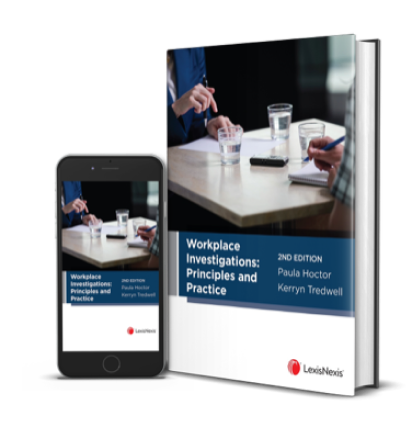SEXUAL HARASSMENT INVESTIGATIONS
Sexual Harassment Allegations: Conducting a Mock Investigation
Learn how to conduct a sexual harassment workplace investigation from our experienced team of legally trained workplace investigators.
- Designed and taught by experts in the field with extensive investigative experience
- Immersive, interactive and practical training with your industry peers
- Access to best practice investigation templates
Let us help you approach the complexities of sexual harassment workplace investigations with certainty.

Conducting Sexual Harassment Workplace Investigations
$995+GST
Workshop details and booking
By the end of this 2 x 1/2 day workshop, you’ll know how to conduct a fair and legally sound sexual harassment workplace investigation.
* Can’t see a workshop date that suits? Contact us to register your interest in an alternative time or location.

Conducting a Sexual Harassment Workplace Investigation
$995+GST
Workshop details and booking
Register your interest

PUBLIC WORKSHOP
Sexual Harassment Allegations: Conducting a Mock Investigation
$595+GST
By the end of this three-hour interactive workshop, you’ll know how to conduct a fair and legally sound sexual harassment workplace investigation from start to finish.
BOOK NOW
Select your preferred delivery mode and date:
Online | 3-hour, small-group immersive session
9am – 12pm (AEST)
When a sexual harassment allegation arises, investigators must act with precision, empathy, and legal clarity. This hands-on workshop is designed to equip professionals who are tasked with conducting internal investigations with the skills to conduct a thorough, fair, and legally sound investigation—without the uncertainty.
What You’ll Learn
This immersive session blends legal fundamentals with practical application. You’ll step into the shoes of an investigator and conduct a ‘speed investigation’ of an allegation of sexual harassment from start to finish.
Workshop Highlights,
- Legal Framework Overview
- A refresher on the key legal requirements surrounding workplace sexual harassment investigations.
- Case Study Simulation
- Apply your knowledge in a guided mock investigation, including:
- Gathering evidence after watching an interview with the impacted person and a witness
- Drafting clear and procedurally fair allegations
- Gathering evidence after watching an interview with the respondent
- Weighing the evidence and assessing credibility
- Making well-reasoned findings
Interactive & Practical
This is not a lecture. It is a practical, scenario-based workshop where you’ll collaborate, reflect, and sharpen your investigative instincts. Led by seasoned Q Workplace Solutions’ Workplace Investigators, you’ll gain insights that go beyond theory.
Register Now
Spots are limited to ensure a highly interactive experience. Book your place here.
For group bookings or enquiries, contact 1300 944 049.
Training feedback
“Great to base it around a case study for some context and practical examples. Very experienced and knowledgeable presenters. Right level of info and engagement.”

“Thank you for the Masterclass on conducting effective investigations. I enjoyed the delivery and content, feeling better equipped to handle an investigation more thoughtfully. The tools and tips you provided will go a long way to helping me prepare when a situation next arises."
Deputy Director Human Resources - (Tertiary Education Sector)
Workplace Investigations: Principles and Practice
Own the essential guide for HR professionals, employment lawyers and workplace investigators. Edited by Paula Hoctor and Kerryn Treadwell.
